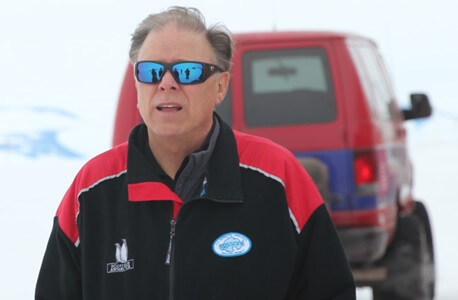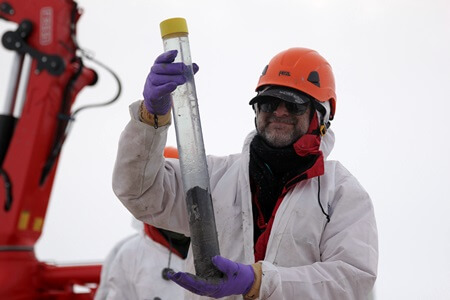Having just returned from a highly successful research expedition in Antarctica, NIU geologists Ross Powell and Reed Scherer will appear as guests during Tuesday’s 7 p.m. broadcast of Chicago Tonight on WTTW11.
The scientists will be interviewed by popular host Phil Ponce.
Powell led a National Science Foundation-funded science team that became the first ever to reach and sample the “grounding zone” along the Ross Ice Shelf, where Antarctic ice, land and sea all converge.
In doing so, the scientists opened a window into a previously unseen and otherworldly environment. They were stunned to discover fish and other marine animals living beneath a half mile of ice in perpetual cold and darkness, posing new questions about the ability of life to thrive in extreme environments.
Data gathered from the grounding zone’s water, sediment and ice samples will provide clues about the mechanics of ice sheets and their potential effects on sea-level rise. The information will help scientific modelers to predict the potential speed of ice sheet demise and the impact of climate change on the world’s oceans and coastal communities.
Known as the Whillans Ice Stream Subglacial Access Research Drilling (WISSARD) project, the effort to drill through a slab of ice thicker than the Empire State Building is tall and reach the seawater beneath involved a collaboration of universities and top scientists from across the country.
Specifically, the team sought out to assess the stability of the West Antarctic Ice Sheet, most of which sits below sea level. (Ice sheets are on land; ice shelves are floating glacial ice over seawater.)
Some recent scientific reports have suggested that collapse of the ice sheet has already begun, though the rate of change deep within the interior of the ice sheet has been unknown. This is the last ice sheet on Earth resting in a deep marine basin and is the most likely player in any future, rapid sea-level rise. If the grounding zone is retreating or primed to retreat, rapid changes in ice behavior could follow over the next century.
Cameras sent down the drill hole revealed the unsuspected population of fish and invertebrates living beneath the ice, the farthest south that fish have ever been found.
More information on the project and photos are available here.


